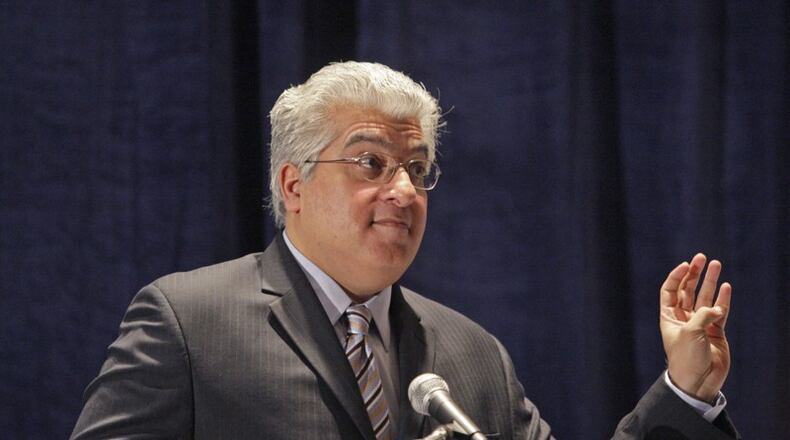Despite the lingering pain of COVID-19, Georgia’s economy has been growing solidly and metro Atlanta is on track to add 77,900 jobs this year, more than two-thirds of the state’s growth, according to a prominent local forecaster.
That growth should return the region to its pre-pandemic level of jobs in the next several months, said Rajeev Dhawan, director of the Georgia State Economic Forecasting Center, during the organization’s quarterly conference Wednesday.
While still afflicting thousands of people, the coronavirus that caused massive disruption in 2020 is no longer the largest economic concern, even if variants cause “wobbles” along the way, he said. “The virus is still with us and it’s going to make our behavior go up and down.”
Atlanta represents the lion’s share of Georgia’s economy and the state’s trajectory is largely dependent on the same factors shaping the national outlook: inflation, interest rates, energy prices, the stock market and the availability of workers, he said. “The pre-pandemic headaches are back.”
Plus one big potential addition: Russia’s invasion of Ukraine, which would send fuel prices even higher and could upend financial markets after stock prices rose through much of the pandemic.
Most of the Atlanta economy has boomed, but jobs are still lacking in the sectors that took the hardest hit from COVID-19, mainly the businesses that rely on in-person spending and travel. Leisure and hospitality is still tens of thousands of jobs shy of its pre-pandemic level.
Still, overall gains in metro Atlanta since the start of the pandemic have been stronger than the national average. That is largely because metro Atlanta continues to reap benefits from its attractiveness as a warmer, lower-cost location than most of the nation’s large northern cities, Dhawan said.
The region keeps drawing workers, which adds to incomes and bolsters housing values — good for property owners, less positive for potential buyers competing for increasingly scarce listings.
“You can’t have 20% home price gains every year,” Dhawan said. “What about the person buying the house from you, the question is about income creation: Do they have the money?”
Yet Atlanta’s overall economic health is tied to the national picture.
Consumer spending could be chilled by higher interest rates, which raise credit card and mortgage costs. The Federal Reserve has all but promised to raise raises in an effort to undercut inflation, which last year hit a 40-year high, with Atlanta seeing the highest increases.
Dhawan predicted that the Fed will modestly lift short-term rates three times starting next month.
However, Fed officials’ public statements have left room for a course change if circumstances shift, and the most immediate economic threat could be fallout from a Russian invasion of Ukraine, Dhawan said.
There’s no sign yet of disruption on global energy markets, but with Russia accounting for more than one-eighth of the world’s oil output, a deepening crisis could send oil prices much higher.
“For us, what matters is the price of gas in the tank,” he said. “If you take 10 million barrels of oil out of the market, there is no one in the world who can replace that.”
One upside of higher oil prices would be to persuade the Federal Reserve that it’s not necessary to aggressively raise interest rates, Dhawan said.
Higher energy prices typically slow the economy, which could do much of the Fed’s work, Dhawan said. “If there is a slowdown in the economy, inflation pressures will be taken care of.”
About the Author
Keep Reading
The Latest
Featured



